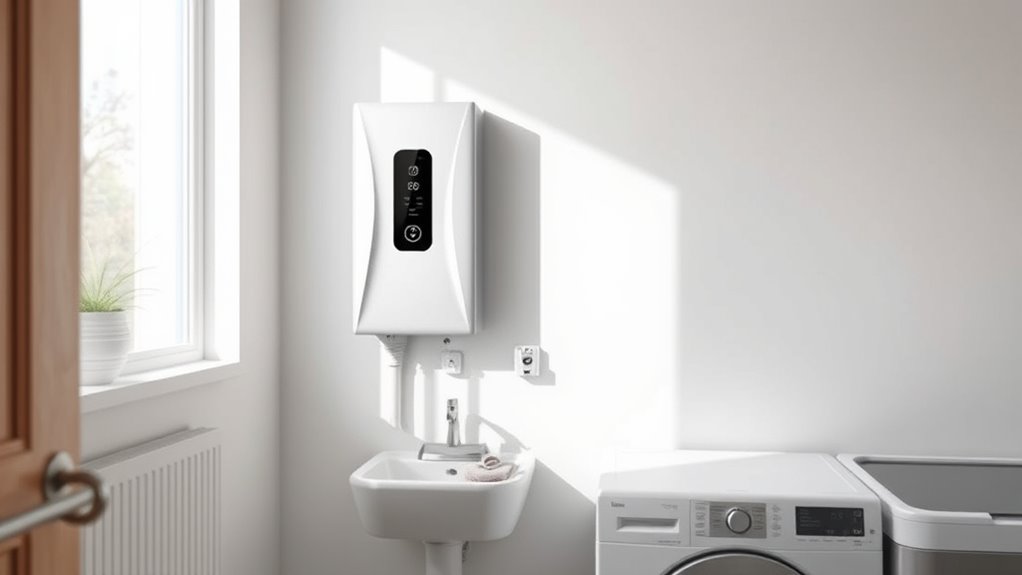Tankless water heaters are perfect for small households because they save space, are energy-efficient, and provide an endless stream of hot water whenever you need it. They are compact and lightweight, fitting easily into tight spots like closets or outdoor areas, which helps free up valuable room. Plus, they only heat water on demand, lowering your energy bills and reducing waste. To discover more about how these units can transform your home, keep exploring their many benefits.
Key Takeaways
- Space-saving design frees up valuable room in small households by eliminating bulky tanks.
- Provides continuous hot water on demand, ideal for multiple simultaneous uses.
- Offers energy efficiency by heating water only when needed, reducing utility bills.
- Durable and low-maintenance, with a lifespan of over 20 years, minimizing replacement costs.
- Enhances modern living with precise temperature control and eco-friendly operation.

Are you tired of running out of hot water during your morning shower? If so, switching to a tankless water heater might be the perfect solution. Unlike traditional systems that store hot water in a bulky tank, tankless models heat water on demand, providing a continuous supply without the need for a large storage tank. This setup is especially beneficial for small households where space is at a premium. With a tankless water heater, you can free up valuable square footage that would otherwise be occupied by a bulky tank, making your home feel more spacious and less cluttered. Its compact design allows you to install it in tight spaces like closets, utility rooms, or even outdoors, maximizing your available room.
Save space and enjoy endless hot water with a compact, energy-efficient tankless water heater.
One of the biggest advantages of tankless water heaters is their impressive energy efficiency. Since they only heat water when you need it, they don’t waste energy maintaining the temperature of stored water like traditional tanks do. This targeted heating method reduces your energy bills and minimizes your carbon footprint, making it an eco-friendly choice for small households. You won’t have to worry about standby heat loss or energy leakage, common issues with conventional water heaters. Instead, you enjoy a steady flow of hot water whenever you need it, without the constant energy drain. Additionally, their cybersecurity vulnerabilities are generally lower because they do not connect to the internet or have remote access features, unlike some smart appliances.
Additionally, tankless water heaters tend to last longer than traditional models. They typically have a lifespan of 20 years or more, compared to about 10-15 years for tank systems. This longevity means you’ll save money in the long run on replacements and repairs. Maintenance is also more straightforward since there’s no tank to corrode or sediment build-up, which can cause inefficiency or failure over time. Many models come with advanced features such as digital temperature controls and remote operation, giving you more control over your hot water supply and further enhancing convenience.
In a small household, where space and energy use are critical, a tankless water heater offers a smart, efficient, and space-saving solution. You get endless hot water, lower utility bills, and extra room in your home—all in one sleek package. It’s a practical upgrade that aligns with modern living, helping you enjoy comfort without sacrificing space or efficiency. If you’re looking to optimize your home’s energy use and maximize your living space, investing in a tankless water heater is a decision you’re unlikely to regret.
Frequently Asked Questions
How Long Do Tankless Water Heaters Typically Last?
Tankless water heaters typically last around 20 years, giving you a longer tank lifespan compared to traditional models. This means you won’t need frequent replacements, saving you money on replacement costs over time. Proper maintenance can extend their lifespan even further. Keep in mind, when it’s time for a replacement, the replacement cost for a tankless system is usually higher upfront but pays off with durability and energy savings.
Are Tankless Water Heaters Suitable for Cold Climates?
Yes, tankless water heaters are suitable for cold climates, but you should consider solar compatibility and installation challenges. You can enjoy hot water even in freezing temperatures, especially with models designed for cold weather. Keep in mind, installation might be more complex due to insulation needs and managing cold weather effects. Properly installed, they provide reliable hot water and energy efficiency, making them a smart choice for chilly environments.
What Maintenance Is Required for Tankless Systems?
You need to perform regular maintenance on your tankless system to keep it running efficiently. This includes flushing the system at least once a year to remove mineral buildup and prevent clogs. Additionally, you should clean or replace the water filter every few months to guarantee proper water flow and quality. Keeping up with these tasks helps extend your system’s lifespan and maintains ideal performance.
Can Tankless Heaters Handle Simultaneous Multiple Uses?
Yes, tankless heaters can handle simultaneous multiple uses by providing instant hot water to multiple fixtures. Depending on the unit’s size and capacity, you can enjoy hot water from the sink, shower, and dishwasher at the same time. Just make certain you select a model with enough flow rate to meet your household’s needs, so everyone gets instant hot water without any disruptions.
Are There Energy Efficiency Rebates Available for Installation?
Yes, there are energy efficiency rebates available for installing tankless water heaters. You can often access installation incentives through local utility companies or government programs, which help reduce your upfront costs. To take advantage of these energy rebates, check with your utility provider or government websites for current offers. These incentives make upgrading to a tankless system more affordable and environmentally friendly, saving you money in the long run.
Conclusion
Switching to a tankless water heater is a smart move for small households. You’ll enjoy endless hot water, save space, and cut down on energy bills. Plus, with less maintenance needed, you’ll have more time to relax and less worry about running out of hot water. It’s a win-win situation that proves sometimes, the best things come in small packages. Don’t wait—making this upgrade could be the best decision you’ve made in a while.









